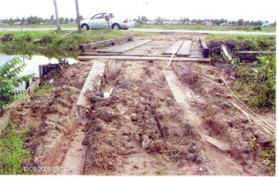-had been complained about since January
-Contractor says workers bought the wrong ‘nails’
The “roughly constructed” $1.1M bridge at Bobby White Street, Bee Hive North was built in less than a day and a subsequent inspection revealed that the project’s contract had most likely been breached by the contractor.
Robert Wight, a concerned citizen of the East Coast Demerara village, has been following the issue vigorously and last Friday said that he will not let it rest until an inquiry is done. Concerns recently raised about the quality of the bridge resulted in Minister of Transport and Hydraulics Robeson Benn and Minister of Local Government Kellawan Lall visiting the site.

Speaking to Stabroek News last Tuesday, Benn had explained that after his visit to the bridge on July 10 he had said that he would recommend that the officer, from whom his ministry had previously requested information about the project and who paid the contractor although the bridge was not built to specifications, be sent on leave pending investigations. The Government Information Agency (GINA) had reported on July 10 that Benn had sent the Region Four officer on leave over the matter.
The bridge provides access from the East Coast Public Road to Bee Hive North. It is the only way by which vehicles can access the area. However, it cannot take the weight it was supposed to carry. This newspaper viewed a certified copy of the bill of quantities and contract for the project which was presented to contractor Narindra Lachman and signed on October 20 last year. The document indicated that the total cost of the project would be $1, 383, 000.
However, Stabroek News understands that the sum was later reduced by $200,000. Lachman and the Regional Executive Officer (REO) Shafdar Alli signed the project contract and work on the bridge, according to Wight, commenced and ended on December 23 last year. Alli, according to the contract, was effectively the employer.
“They [the contractor and his team] were supposed to remove the entire structure and build it from scratch,” Wight explained, “but all they did was remove the top of the bridge and rebuild it.”
Last December the finished bridge was left in a terrible condition, Wight recalled, and residents were forced to throw saw dust and place planks at the approaches so that vehicles would not sink into the soft mud left there. Wight also pointed out that the bridge’s entire structure was faulty and described the contractor’s work as “substandard”.
The Haslington/Grove Neighbourhood Democratic Council (NDC) was directly managing the bridge project. As complaints of the bridge’s quality became more frequent the NDC was forced to write to the Regional Chairman for Region Four, Clement Corlette. A copy of the letter, dated January 13, 2009 seen by this newspaper informed the Regional Chairman of “several defects in the construction of this bridge”.
According to the letter, old and rotten decking planks were used by the contractor to build the revetment; nails instead of six inch spikes were used on the decking and the approaches on both sides of the bridge were filled with mud. Further, the letter which was signed by Deputy Chair of the Haslington/Grove NDC, C. King, continued to say “This bridge was constructed in less than a day…Residents are unanimous in their complaints, and I am therefore requesting an urgent investigation and recommend that no payments should be made until this matter is investigated.”
Another letter to the region’s engineer, dated January 28, 2009 and copied to President Bharrat Jagdeo and Corlette, further revealed that four planks across the bridge are of a shorter length; beams were not installed at either end of the bridge to prevent erosion of the street end/parapet; and the bridge was not replaced in its original position and was out by one and a half feet.
Corlette, speaking to Stabroek News earlier about the issues surrounding the bridge, had explained that the bridge was repositioned because initially it was too close to a water main. “It was only sensible to move it” the Regional Chairman had said.
Breach of Contract and penalty
The above mentioned faults were again verified when the Region’s engineer visited the site accompanied by Lachman, Wight, King and two councillors of the Haslington/Grove NDC.
Two shortcomings listed in the February 5 inspection report were that the old materials from the bridge were not set aside as stipulated in the contract; and wailers were not affixed below the bridge and only about 48 feet of wailers were put around the top (bolts were not seen at the end and the contract stipulated 140 feet of wailers).
Lachman, when contacted on Friday by Stabroek News about the possible breach of contract, said that he conducted his work on the bridge according to the bill of quantities provided. The contractor also said that there was a revised version of the bill of quantities.
Questioned about the various faults found with the structure Lachman was at first reluctant to speak. However, he admitted that instead of using six-inch screws as specified by the bill of quantities he used four-inch screws instead.
“The bill called for six inch screws,” Lachman said, “but they [workers] ended up buying four inch screws instead. There is only a $20 dollars price difference between the two,” he stressed, “so it’s not like we’re making a million by buying a smaller screw.”
With regard to the issue of the revetment Lachman said that it was constructed according to specifications. However, he explained that because the revetment is between four and five feet in height “it is short and can’t really be seen”. The man confirmed that he has been paid for the job and still has “a few more adjustments to make”. Lachman refused to comment further.
The contract signed by REO, Alli, and Lachman clearly states “…failing to complete all or part of this contract, a penalty of $1500 will be levied against the contractor for each day that the Contractor delays to complete works” within 30 days. However, there has been no indication from the RDC of whether they will recognize Lachman’s failure to complete the bridge according to specifications as a breach of their agreement and if the penalty will be instituted.
Questions remain as to who inspected Lachman’s work before the decision was made to disburse monies. The contract signed between Lachman and Alli said in part that all work had to be completed to the satisfaction of “the Employer (Alli) or his duly authorized representative in accordance with the accompanying plans, schedules, etc. specifications and general conditions … and the Regional Executive Officer agrees that subject to the performance of the contractor of this contract, the contractor shall receive and be paid the sum” of $1.3M.

